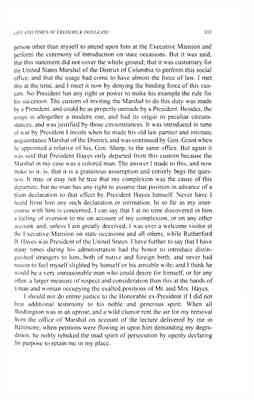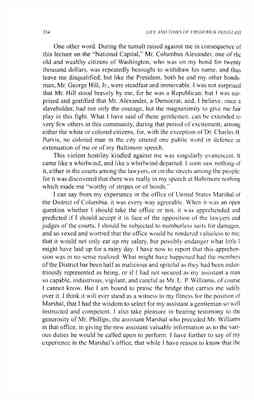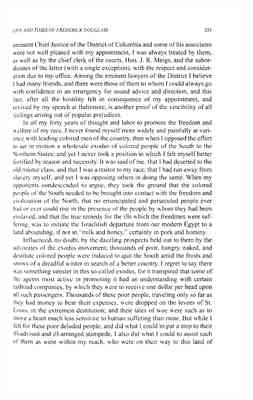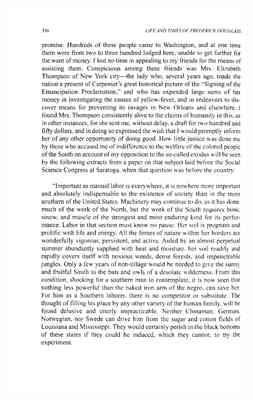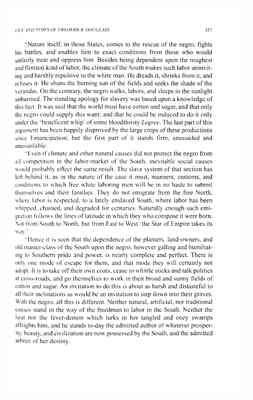Pages
181
LIFE AND TIMES OF FREDERICK DOUGLASS 333
person other than myself to attend upon him at the Executive Mansion and perform the ceremony of introduction on state occasions. But it was said, that this statement did not cover the whole ground; that it was customary for the United States Marshal of the District of Columbia to perform this social office; and that the usage had come to have almost the force of law. I met this at the time, and I meet it now by denying the binding force of this custom. No President has any right or power to make his example the rule for his successor. The custom of inviting the Marshal to do this duty was made by a President, and could be as properly unmade by a President. Besides, the usage is altogether a modern one, and had its origin in peculiar circumstances, and was justified by those circumstances. It was introduced in time of war by President Lincoln when he made his old law partner and intimate acquaintance Marshal of the District, and was continued by Gen. Grant when he appointed a relative of his, Gen. Sharp, to the same office. But again it was said that President Hayes only departed from this custom because the Marshal in my case was a colored man. The answer I made to this, and now make to it, is, that it is a gratuitous assumption and entirely begs the question. It may or may not be true that my complexion was the cause of this departure, but no man has any right to assume that position in advance of a plain declaration to that effect by President Hayes himself. Never have I heard from him any such declaration or intimation. In so far as my intercourse with him is concerned, I can say that I at no time discovered in him a feeling of aversion to me on account of my complexion, or on any other account, and, unless I am greatly deceived. I was ever a welcome visitor at the Executive Mansion on state occasions and all others, while Rutherford B. Hayes was President of the United States. I have further to say that I have many times during his administration had the honor to introduce distinguished strangers to him, both of native and foreign birth, and never had reason to feel myself slighted by himself or his amiable wife; and I think he would he a very unreasonable man who could desire for himself or for any other, a larger measure of respect and consideration than this at the hands of a man and woman occupying the exalted positions of Mr. and Mrs. Hayes.
I should not do entire justice to the Honorable ex-President if I did not bear additional testimony to his noble and generous spirit. When all Washington was in an uproar, and a wild clamor rent the air for my removal from the office of Marshal on account of the lecture delivered by me in Baltimore, when petitions were flowing in upon him demanding my degradation, he nobly rebuked the mad spirit of persecution by openly declaring his purpose to retain me in my place.
182
334 LIFE AND TIMES OF FREDERICK DOUGLASS
One other word. During the tumult raised against me in consequence of this lecture on the "National Capital," Mr. Columbus Alexander, one of the old and wealthy citizens of Washington, who was on my bond for twenty thousand dollars, was repeatedly besought to withdraw his name, and thus leave me disqualified; but like the President, both he and my other bondsman, Mr. George Hill, Jr., were steadfast and immovable. I was not surprised that Mr. Hill stood bravely by me, for he was a Republican; but I was surprised and gratified that Mr. Alexander, a Democrat, and, I believe, once a slaveholder, had not only the courage, but the magnanimity to give me fair play in this fight. What I have said of these gentlemen, can be extended to very few others in this community, during that period of excitement, among either the white or colored citizens, for, with the exception of Dr. Charles B. Purvis, no colored man in the city uttered one public word in defence or extenuation of me or of my Baltimore speech.
This violent hostility kindled against me was singularly evanescent. It came like a whirlwind, and like a whirlwind departed. I soon saw nothing of it, either in the courts among the lawyers, or on the streets among the people; for it was discovered that there was really in my speech at Baltimore nothing which made me "worthy of stripes or of bonds."
I can say from my experience in the office of United States Marshal of the District of Columbia, it was every way agreeable. When it was an open question whether I should take the office or not, it was apprehended and predicted if I should accept it in face of the opposition of the lawyers and judges of the courts, I should be subjected to numberless suits for damages, and so vexed and worried that the office would be rendered valueless to me; that it would not only eat up my salary, but possibly endanger what little I might have laid up for a rainy day. I have now to report that this apprehension was in no sense realized. What might have happened had the members of the District bar been half as malicious and spiteful as they had been industriously represented as being, or if I had not secured as my assistant a man so capable, industrious, vigilant, and careful as Mr. L. P. Williams, of course I cannot know. But I am bound to praise the bridge that carries me safely over it. I think it will ever stand as a witness to my fitness for the position of Marshal, that I had the wisdom to select for my assistant a gentleman so well instructed and competent. I also take pleasure in bearing testimony to the generosity of Mr. Phillips, the assistant Marshal who preceded Mr. Williams in that office, in giving the new assistant valuable information as to the various duties he would be called upon to perform. I have further to say of my experience in the Marshal's office, that while I have reason to know that the
183
LIFE AND TIMES OF FREDERICK DOUGLASS 335
eminent Chief Justice of the District of Columbia and some of his associates were not well pleased with my appointment, I was always treated by them, as well as by the chief clerk of the courts, Hon. J. R. Meigs, and the subordinates of the latter (with a single exception), with the respect and consideration due to my office. Among the eminent lawyers of the District I believe I had many friends, and there were those of them to whom I could always go with confidence in an emergency for sound advice and direction, and this fact, after all the hostility felt in consequence of my appointment, and revived by my speech at Baltimore, is another proof of the vincibility of all feelings arising out of popular prejudices.
In all my forty years of thought and labor to promote the freedom and welfare of my race. I never found myself more widely and painfully at variance with leading colored men of the country, than when I opposed the effort to set in motion a wholesale exodus of colored people of the South to the Northern States; and yet I never took a position in which I felt myself better fortified by reason and necessity. It was said of me, that I had deserted to the old master class, and that I was a traitor to my race; that I had run away from slavery myself, and yet I was opposing others in doing the same. When my opponents condescended to argue, they took the ground that the colored people of the South needed to be brought into contact with the freedom and civilization of the North; that no emancipated and persecuted people ever had or ever could rise in the presence of the people by whom they had been enslaved, and that the true remedy for the ills which the freedmen were suffering, was to initiate the lsraelitish departure from our modern Egypt to a land abounding, if not in "milk and honey," certainly in pork and hominy.
Influenced, no doubt, by the dazzling prospects held out to them by the advocates of the exodus movement, thousands of poor, hungry, naked, and destitute colored people were induced to quit the South amid the frosts and snows of a dreadful winter in search of a better country. I regret to say there was something sinister in this so-called exodus, for it transpired that some of the agents most active in promoting it had an understanding with certain railroad companies, by which they were to receive one dollar per head upon all such passengers. Thousands of these poor people, traveling only so far as they had money to bear their expenses, were dropped on the levees of St. Louis, in the extremest destitution; and their tales of woe were such as to move a heart much less sensitive to human suffering than mine. But while I felt for these poor deluded people, and did what I could to put a stop to their ill-advised and ill-arranged stampede. I also did what I could to assist such of them as were within my reach, who were on their way to this land of
184
336 LIFE AND TIMES OF FREDERICK DOUGLASS
promise. Hundreds of these people came to Washington, and at one time there were from two to three hundred lodged here, unable to get further for the want of money. I lost no time in appealing to my friends for the means of assisting them. Conspicuous among these friends was Mrs. Elizabeth Thompson of New York city-the lady who, several years ago, made the nation a present of Carpenter's great historical picture of the "Signing of the Emancipation Proclamation," and who has expended large sums of her money in investigating the causes of yellow-fever, and in endeavors to discover means for preventing its ravages in New Orleans and elsewhere. I found Mrs. Thompson consistently alive to the claims of humanity in this, as in other instances, for she sent me, without delay, a draft for two hundred and fifty dollars, and in doing so expressed the wish that I would promptly inform her of any other opportunity of doing good. How little justice was done me by those who accused me of indifference to the welfare of the colored people of the South on account of my opposition to the so-called exodus will be seen by the following extracts from a paper on that subject laid before the Social Science Congress at Saratoga, when that question was before the country:
"Important as manual labor is everywhere, it is nowhere more important and absolutely indispensable to the existence of society than in the more southern of the United States. Machinery may continue to do, as it has done, much of the work of the North, but the work of the South requires bone, sinew, and muscle of the strongest and most enduring kind for its performance. Labor in that section must know no pause. Her soil is pregnant and prolific with life and energy. All the forces of nature within her borders are wonderfully vigorous, persistent, and active. Aided by an almost perpetual summer abundantly supplied with heat and moisture, her soil readily and rapidly covers itself with noxious weeds, dense forests. and impenetrable jungles. Only a few years of non-tillage would be needed to give the sunny and fruitful South to the bats and owls of a desolate wilderness. From this condition, shocking for a southern man to contemplate, it is now seen that nothing less powerful than the naked iron arm of the negro, can save her. For him as a Southern laborer, there is no competitor or substitute. The thought of filling his place by any other variety of the human family, will be found delusive and utterly impracticable. Neither Chinaman, German, Norwegian, nor Swede can drive him from the sugar and cotton fields of Louisiana and Mississippi. They would certainly perish in the black bottoms of these states if they could be induced, which they cannot, to try the experiment.
185
LIFE AND TIMES OF FREDERICK DOUGLASS 337
"Nature itself in those States, comes to the rescue of the negro, fights his battles, and enables him to exact conditions from those who would unfairly treat and oppress him. Besides being dependent upon the roughest and flintiest kind of labor, the climate of the South makes such labor uninviting and harshly repulsive to the white man. He dreads it, shrinks from it, and refuses it. He shuns the burning sun of the fields and seeks the shade of the verandas. On the contrary, the negro walks, labors, and sleeps in the sunlight unharmed. The standing apology for slavery was based upon a knowledge of this fact. It was said that the world must have cotton and sugar, and that only the negro could supply this want; and that he could be induced to do it only under the 'beneficent whip' of some bloodthirsty Legree. The last part of this argument has been happily disproved by the large crops of these productions since Emancipation; but the first part of it stands firm, unassailed and unassailable.
"Even if climate and other natural causes did not protect the negro from all competition in the labor-market of the South, inevitable social causes would probably effect the same result. The slave system of that section has left behind it, as in the nature of the case it must, manners, customs, and conditions to which free white laboring men will be in no haste to submit themselves and their families. They do not emigrate from the free North, where labor is respected, to a lately enslaved South, where labor has been whipped, chained, and degraded for centuries. Naturally enough such emigration follows the lines of latitude in which they who compose it were born. Not from South to North, but from East to West "the Star of Empire takes its way."
"Hence it is seen that the dependence of the planters, land-owners, and old master-class of the South upon the negro, howewr galling and humiliating to Southern pride and power, is nearly complete and perfect. There is only one mode of escape for them, and that mode they will certainly not adopt. It is to take off their own coats, cease to whittle sticks and talk politics at cross-roads, and go themselves to work in their broad and sunny fields of cotton and sugar. An invitation to do this is about as harsh and distasteful to all their inclinations as would be an invitation to step down into their graves. With the negro, all this is different. Neither natural, artificial, nor traditional causes stand in the way of the freedman to labor in the South. Neither the heat nor the fever-demon which lurks in her tangled and oozy swamps affrights him, and he stands to-day the admitted author of whatever prosperity, beauty, and civilization are now possessed by the South, and the admitted arbiter of her destiny.
